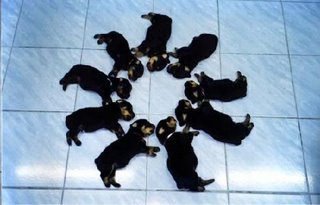Illusion of disillusions
Acerca de mí

- Nombre: K.
- Ubicación: Tuvalu
Pensé que no tenía origen, que simplemente era una letra que soñaba ser borboleta; tres líneas cruzadas que se asombraban con sus encuentros y desencuentros; pensé que era alguien a quien le aterrorizaba el aterrizaje y prefería usar las palabras para asirse a la tierra. Ahora sé que vengo de los jázaros y que los sueños (tanto dormida como despierta) son lo mio. Algunos (creen que) me (llaman) gusta el (ser) Bella Durmiente. Yo sé que soy (Bella) y (que) duermo, y sin embargo, (no) espero el (beso) ajeno (para) despertar.
miércoles, mayo 31, 2006
martes, mayo 30, 2006
La transparencia del espíritu traducida al cuerpo... ¿o no?

CAST NO SHADOWS
May 25th 2006 (de The Economist)
How to weave a cloak that makes you invisible
IN NORSE mythology, a magic cloak granted invisibility to Sigurd, a
demi-god and skilled warrior with superhuman strength. Millennia later,
a similar garment bestowed invisibility on Harry Potter, a schoolboy
wizard. In the mortal (or Muggle) realm, engineers have for years tried
with varying degrees of success to build such a device. This week a
team of physicists and materials scientists announced it had devised a
pattern for a potentially perfect invisibility cloak.
Light is an electromagnetic wave, with a longer wavelength than X-rays
and ultraviolet, and a shorter wavelength than infra-red, microwaves
and radio waves. All these electromagnetic waves are governed by four
mathematical expressions established almost 150 years ago by James
Clerk Maxwell. These equations represent one of the most elegant and
concise ways to state the behaviour of electric and magnetic fields and
how they interact with matter. However, because they are so concise,
they also embody a high level of mathematical sophistication.
The team--Sir John Pendry of Imperial College London with David Schurig
and David Smith of Duke University in North Carolina--used the
equations to devise a way to cloak an object with a material that would
deflect the rays that would have struck it, guide them around it and
return them to their original trajectory. Maxwell's equations conserve
certain properties--the magnetic field intensity, the electric
displacement field and the Poynting vector that describes the electric
flux of an electromagnetic field. These properties remain the same when
others are altered. The team showed how these fields could be
manipulated to flow around objects like a fluid, returning undisturbed
to their original paths. The findings were published online this week
by SCIENCE.
The trick is to use metamaterials: materials that owe their
characteristics to features of their structure that are smaller than
the wavelength of the electromagnetic radiation. For light, this is on
the scale of tens of thousandths of a millimetre. Metamaterials can and
have been designed and made to possess certain properties, even
counter-intuitive ones. Using metamaterials means the scheme should
work for all objects, regardless of their shape. Moreover, unlike other
proposed invisibility cloaks, it does not require knowledge of what is
behind the wearer, nor are crude projections involved.
So far, so good: the theory is in place. Sadly, the implementation lags
behind. Moreover, there are several other difficulties that may prevent
a device conferring total invisibility from being built. The first is
that the plan described by Sir John and his colleagues works only for a
small range of wavelengths. A surgeon wearing metamaterial gloves tuned
to make his hands invisible might benefit from being able to see
exactly where the scalpel was cutting. However, an invisibility cloak
designed to hide something from people who were looking for it would
not work. An aeroplane shrouded in such kit might be invisible to the
human eye but it would be picked up readily by radar, which operates at
radio wavelengths.
Even if it ultimately proved possible to make an aeroplane completely
invisible at all wavelengths, there would be a further problem.
According to the laws of physics, an invisible person would necessarily
be blind. In order to see light, the eye must absorb it, but in order
for a person to be invisible, the body must not absorb any light. Thus,
a spy plane could not be completely invisible if it were to be used for
espionage or, indeed, flown at all, since its pilots would need to know
its position relative to the ground.
lunes, mayo 29, 2006
Freedom of Web!!!

(del NYTimes)
Editorial Observer
Why the Democratic Ethic of the World Wide Web May Be About to End
Article Tools Sponsored By
By ADAM COHEN
Published: May 28, 2006
The World Wide Web is the most democratic mass medium there has ever been. Freedom of the press, as the saying goes, belongs only to those who own one. Radio and television are controlled by those rich enough to buy a broadcast license. But anyone with an Internet-connected computer can reach out to a potential audience of billions.
This democratic Web did not just happen. Sir Tim Berners-Lee, the British computer scientist who invented the Web in 1989, envisioned a platform on which everyone in the world could communicate on an equal basis. But his vision is being threatened by telecommunications and cable companies, and other Internet service providers, that want to impose a new system of fees that could create a hierarchy of Web sites. Major corporate sites would be able to pay the new fees, while little-guy sites could be shut out.
Sir Tim, who keeps a low profile, has begun speaking out in favor of "net neutrality," rules requiring that all Web sites remain equal on the Web. Corporations that stand to make billions if they can push tiered pricing through have put together a slick lobbying and marketing campaign. But Sir Tim and other supporters of net neutrality are inspiring growing support from Internet users across the political spectrum who are demanding that Congress preserve the Web in its current form.
The Web, which Sir Tim invented as a scientist at CERN, the European nuclear physics institute, is often confused with the Internet. But like e-mail, the Web runs over the system of interconnected computer networks known as the Internet. Sir Tim created the Web in a decentralized way that allowed anyone with a computer to connect to it and begin receiving and sending information.
That open architecture is what has allowed for the extraordinary growth of Internet commerce and communication. Pierre Omidyar, a small-time programmer working out of his home office, was able to set up an online auction site that anyone in the world could reach — which became eBay. The blogging phenomenon is possible because individuals can create Web sites with the World Wide Web prefix, www, that can be seen by anyone with Internet access.
Last year, the chief executive of what is now AT&T sent shock waves through cyberspace when he asked why Web sites should be able to "use my pipes free." Internet service providers would like to be able to charge Web sites for access to their customers. Web sites that could not pay the new fees would be accessible at a slower speed, or perhaps not be accessible at all.
A tiered Internet poses a threat at many levels. Service providers could, for example, shut out Web sites whose politics they dislike. Even if they did not discriminate on the basis of content, access fees would automatically marginalize smaller, poorer Web sites.
Consider online video, which depends on the availability of higher-speed connections. Internet users can now watch channels, like BBC World, that are not available on their own cable systems, and they have access to video blogs and Web sites like YouTube.com, where people upload videos of their own creation. Under tiered pricing, Internet users might be able to get videos only from major corporate channels.
Sir Tim expects that there are great Internet innovations yet to come, many involving video. He believes people at the scene of an accident — or a political protest — will one day be able to take pictures with their cellphones that could be pieced together to create a three-dimensional image of what happened. That sort of innovation could be blocked by fees for the high-speed connections required to relay video images.
The companies fighting net neutrality have been waging a misleading campaign, with the slogan "hands off the Internet," that tries to look like a grass-roots effort to protect the Internet in its current form. What they actually favor is stopping the government from protecting the Internet, so they can get their own hands on it.
But the other side of the debate has some large corporate backers, too, like Google and Microsoft, which could be hit by access fees since they depend on the Internet service providers to put their sites on the Web. It also has support from political groups of all persuasions. The president of the Christian Coalition, which is allied with Moveon.org on this issue, recently asked, "What if a cable company with a pro-choice board of directors decides that it doesn't like a pro-life organization using its high-speed network to encourage pro-life activities?"
Forces favoring a no-fee Web have been gaining strength. One group, Savetheinternet.com, says it has collected more than 700,000 signatures on a petition. Last week, a bipartisan bill favoring net neutrality, sponsored by James Sensenbrenner, Republican of Wisconsin, and John Conyers Jr., Democrat of Michigan, won a surprisingly lopsided vote in the House Judiciary Committee.
Sir Tim argues that service providers may be hurting themselves by pushing for tiered pricing. The Internet's extraordinary growth has been fueled by the limitless vistas the Web offers surfers, bloggers and downloaders. Customers who are used to the robust, democratic Web may not pay for one that is restricted to wealthy corporate content providers.
"That's not what we call Internet at all," says Sir Tim. "That's what we call cable TV."
viernes, mayo 26, 2006
jueves, mayo 25, 2006
no solo Becket usa la arena...
¿cursí? si, ¿música terrible? sí
Pero es una maravilla....
www.sandfantasy.com
Pero es una maravilla....
www.sandfantasy.com
La palabra aun puede rescatar a todos


"La palabra aún puede rescatar a todos"
En intercambio de ideas, Roy y Galeano llaman a defender la verdad sin concesiones
DAVID BROOKS CORRESPONSAL (de La Jornada, Martes 23)
La escritores Arundhati Roy y Eduardo Galeano movilizaron las conciencias de centenas de admiradores que acudieron a escucharlos en el Town Hall, en el centro de Nueva York. Las imágenes son de archivo Fotos Reuters y La Jornada
Nueva York, 22 de mayo. Eduardo Galeano y Arundhati Roy insisten en defender la palabra, en dar nombre a las cosas y en que hablar con la verdad ante el poder aún nos puede rescatar a todos.
"Como escritores intentamos integrar este mundo desintegrado", expresa Galeano, aunque para Roy escritores como ella y su colega uruguayo "nos encontramos entre la desesperanza personal y la desesperanza pública". Como está el mundo "estamos escribiendo en una zona de guerra... a veces se siente imposible regresar al escritorio".
Su defensa de la palabra es celebrada por millones de lectores y por el hecho de que aquí se agotaron las entradas, con más de mil 500 personas que llegaron en busca de ser consoladas, nutridas o para hallar un eco a su desesperación. De ahí nace la solidaridad, por lo menos por un par de horas, en el Town Hall, en el centro de Nueva York, donde Roy y Galeano ofrecen lecturas de fragmentos de su trabajo (ella de su novela El dios de las pequeñas cosas y él de su nuevo libro de observaciones y cuentos Bocas del tiempo). Después abren un diálogo.
Dicen que son gemelos. A veces ven los mismos colores en el mundo, a veces no (el tema de uno de los cuentos del nuevo libro), pero ambos son cazadores de la verdad en un entorno inundado de engaños, mentiras, sobre todo -afirman- eso de que nada se puede hacer, de que toda alternativa a esta realidad ya ha sido anulada.
"Necesitamos pensar en una política de oposición... de portarnos como gente muy difícil que rehúsa que se nos haga esto", afirma Roy. "Sobrevivimos por la herencia de la solidaridad", piensa Galeano. El intercambio es a veces en respuesta a las preguntas del otro, a veces en respuesta a las dudas e interrogantes de cada uno.
De esta manera, los dos autores regalan sus palabras a un público de admiradores, una gama poco sorprendente de la izquierda "ilustrada" de Nueva York, junto con algunos personajes conocidos en un ámbito más grande del circuito generalmente cómodo de la "oposición" autoproclamada de este país, como el director Jonathan Demme, el cantautor David Byrne y el dramaturgo y actor Wallace Shawn. También acudieron numerosos jóvenes que despiertan guiados por la palabras de sus héroes en el escenario. Galeano y Roy complacen a los asistentes con sus acertados y articulados ataques al armamentismo, a las ocupaciones militares y a las ocupaciones por la "chequera" del capital financiero, así como el desgaste de la democracia, la creciente represión y la gran pregunta de cómo se enfrenta todo esto.
Pero fue donde aún no existen palabras o frases completas, o donde hay demasiadas dudas, lo más vital de este intercambio: las dudas, la recuperación de la solidaridad, la insistencia en la locura para enfrentar la locura, la proclamación de la rebelión, a veces serena, a veces terremoto, que compartieron con el público.
Aquí algunos fragmentos de este diálogo:
Arundhati Roy: ''Como persona involucrada en mucha actividad política de base en India, una cosa que me aterroriza es que uno siempre está destinado a luchar al lado de gente que no tiene ningún espacio para ti en su imaginario social. Es un proceso muy complicado: la primera parte de mi vida la pasé batallando como mujer en India, batallando y con la esperanza de no casarme con un hombre de mi pueblo que me pegara los fines de semana. Batallando contra la tradición, sólo para después enfrentarme con una modernidad tan horrenda. Es una cosa que espanta. (...)
"La gente lucha junta, pero quizá están soñando un sueño distinto. ¿Cómo negocias con eso? Es un trabajo extremadamente difícil, tratar de encontrar cómo caminar por ahí. ¿Quién te va a decir cuáles son las reglas? ¿Qué tan prístino quieres ser? Alguien como yo siempre está a la orilla (de los movimientos de masas). No puedes ser completamente parte de ello, sin embargo, lo apoyas."
EG: Tantas contradicciones...pero así es la vida... por eso la vida se mueve...
AR: ¡Pero Irak sigue ocupada! Tenemos que parar eso. La matanza tiene que terminar. Tenemos que encontrar la manera, y creo que en buena medida la responsabilidad es de la gente en este país. Ustedes tienen que encontrar la manera de frenarlo.
AR: En los setentas, y un poco antes, los gobiernos estadunidenses estaban ocupados derribando democracias, ahora aprendieron a vaciar la democracia. Hasta en Estados Unidos, cuando estaban Bush y Kerry (contendiendo por la presidencia), era como escoger entre marcas de jabón: ya sea que compres esta marca o aquella, todas pertenecen a Procter & Gamble.
"El movimiento antiguerra apoyó a Kerry, pero él no decía que sacaría las tropas."
EG : Este divorcio entre las palabras y los hechos trabaja contra el prestigio de la democracia y el lenguaje. Fue un gran escándalo cuando Evo (Morales) nacionalizó el gas. ¿Cuál era el imperdonable pecado? Que hizo exactamente lo que prometió hacer.
AR: Ya sea India, Sudáfrica, Brasil o Bolivia, todos tienen la amenaza de fuga de capital. El internacionalismo debe venir de que estos países se unan, porque una de las cosas buenas para el establishment, es que la democracia está dentro de las fronteras nacionales, en cambio, el capital está afuera de ellas. Tienes libre flujo de capital, pero tienes policía, fronteras militarizadas. A menos de que haya una unión entre los países del sur, el minuto en que tomes el poder estás amenazado. Habrá vuelo de capital. No es suficiente decir que esta gente es mala, porque hay un sistema que provoca que esto suceda.
EG: Para las nuevas generaciones, ¿cuáles son los modelos de éxito?, ¿las imágenes de la virtud? Mi pobre madre decía que las mentiras tienen piernas cortas. No es verdad, tienen piernas muy largas, y corren más rápido que los mentirosos.
"En las elecciones democráticas, nos entrenan para aceptar que un político es alguien lo suficientemente listo como para mentir como si estuviera diciendo la verdad.
"Hay una crisis de fe en la democracia, especialmente entre los jóvenes. Hasta en un modelo como Chile, tres de cada cuatro jóvenes no votaron..."
AR: Pero cuando tienes Tide y Ivory Snow, ¿qué caso tiene votar? Yo también sufro de una crisis de fe en la democracia. Creo que es muy importante tener esta crisis porque la democracia ya no es democracia...
EG: La democracia debería ser democracia, pero ha sido traicionada por los profesionales de la democracia.
AR: Se volvió simplemente una ceremonia de la democracia.
EG: Como una misa sin dios.
"Este es el reto. Deberíamos de construir una nueva democracia, pero tienes el problema de los superpoderes que gobiernan, que ahorcan los salarios, que matan todo lo que tocan. ¿Cómo puedes convencer a los jóvenes de seguir un camino distinto? ¿Son éstos sus modelos de éxito? Creo que es necesario abrir nuevos caminos a una democracia verdadera, pero es muy difícil."
AR: (En India) las masas entienden profundamente que esta no es la vía a seguir...
Cómo librar esta guerra es lo que sigue siendo la pregunta. Creo que no nos deberíamos de ocupar primero de la política de los gobiernos, sino de la política de la oposición, de la política de ser gente de verdad difícil, que se rehúsa a dejar que nos hagan esto.
Galeano concluyó el diálogo con algo que había escrito en el viaje de avión a Estados Unidos:
"En tiempos oscuros, tengamos el talento suficiente para aprender a volar en la noche, como murciélagos; seamos lo suficientemente sanos como para vomitar las mentiras que nos obligan a tragar cada día; seamos lo suficientemente valientes como para tener el coraje de estar solos y lo suficientemente valientes como para arriesgarnos a estar juntos...
"Seamos lo suficientemente maduros como para saber que podemos ser compatriotas y contemporáneos de todos los que tienen una voluntad de belleza y una voluntad de justicia, sin importar dónde nacieron ni dónde se encuentran, porque no creemos en las fronteras de los mapas ni del tiempo, seamos lo suficientemente tercos como para seguir creyendo, contra toda evidencia, que la condición humana vale la pena....
"Seamos lo suficientemente locos como para ser llamados locos... seamos lo suficientemente inteligentes como para ser desobedientes cuando recibimos órdenes contradictorias a nuestra conciencia o contra el sentido común
miércoles, mayo 24, 2006
martes, mayo 23, 2006
The ofishiousness of existence
The ofishiousness of existence
Fish on earth
I think I am a fish, or I am the concept of a fish, a live one, not in the ocean roaming free, although that could be the case, and I am not in a river swimming backwards to plant my eggs somewhere. No, that’s just not it. I am in a glass thing that constitutes my whole environment, my whole world, everything I’ve known my whole life, and what my tomb will be, that is the kind of place I swim in.
I like to think that I am an incredible swimmer, that if there were a kind of ‘glass race olimpics’ I would win; yes, I like to think that. I like to think. I like to think more than I like to swim. Because when I swim I have to think, but when I think I don’t have to swim.
Yes, I think I am a fish, even if I swim or don’t. When I do swim, it makes all the thoughts conferred on this one be so much more realistic. It’s like because I have to think to be able to swim, when I think I am a fish and I swim, then it all makes sense. To me, at least.
So there is this thing called a fish bowl, or a glass thingy or whatever, and that is my world. Once I heard on another being, who thought he was a leopard, but its real name was ‘earth’, I think he drowned, well, he told me about other places, but I prefer to imagine they don’t exist.
There is a problem with the place I live in, it is too small. Other fish used to live here with me, but I thought that the place was overcrowded, so I ate them, now I am much bigger and I barely fit in here.
The way I swim is very different to the way other fish swim, you see, no you don’t, you swim, with fins and scales and blowing bubbles in the way, its an art. Swimming is an art. My swimming is an art. If there was a Nobel prize for ‘artistic swimming’ I would win it and blow a great big blue bubble for the queen of Norway. That I would do.
What I do with my time is of no importance whatsoever, although I use my time in the most respectful way possible: doing absolutely nothing; to do nothing requires a lot of training and meditation, it is not something that anyone in their right mind could do, oh no, not at all. The way I mastered this healthy and inspiring act was to prove that if I did do something it would be absolutely useless and non essential for life on this earth; so given the alternative of doing something absolutely irrelevant to the universe, absolutely useless to any kind of primate or fishy species, and making it absolutely difficult to get any piece of a peace of mind. So with that I realized that the only sane choice I had was to learn and master the ancient art of doing nothing.
It was difficult at first, very very difficult, the habit of doing useless things grows into one like fungus under a fish’s scales, and everyone knows that habits and fungus are very hard to get rid of.
That is the healthiest thing I ever did, doing nothing, and it even takes up a lot of strength and mind potential, you see, when you do nothing, if you are really doing nothing you cant even think, because although to everyone else you are doing nothing, you are cheating, and you are thinking, and doing lots of stuff inside yourself. So you cant think, you cant cheat, and you cant do anything, not even breathe, because I don’t, usually anyway. I heard sometime that they call this meditation, I wouldn’t really know, because to do the yoguistic position I would have to have legs, and well, my fins don’t bend, and I never sit down. So that’s that.
Once, before I knew how to do nothing I dreamt, and I used to catalog these dreams by different color bubbles, so if I wished to have or to recall a dream in particular all I had to do was blow the bubble that summoned up that specific dream. So for example the big pink bubble, not the biggest, of course, that was the ménage a troi with an octopus one, but the one after that was the love and picnic one, of course in my own terms, like the picnic was actually on seashells and sand, and the food was actually algae, and the company, well that would be a big blowup fish that wouldn’t eat all of my food and wouldn’t disturb me with unpleasant conversation. That was the big (not biggest) pink bubble dream.
I wish time was like when you blow bubbles, (or smoke a joint), that it expands and spreads out endlessly, it is just as long as you want it to be. It never loses that feeling of moments, many many moments in just one moment, many feelings and intensities in one single spam of time, one being of time. Just so so so long.
And the yellowish bubble, a fiction of mine that came as a breakthrough after having intoxicated myself with fungus, was the one about a huge immensity of water in different shades of blue and green, reflecting the blue and white above, but oh, that was but a dream, and the fishbowl is so much safer and cozier than infinity.
Fish on earth
I think I am a fish, or I am the concept of a fish, a live one, not in the ocean roaming free, although that could be the case, and I am not in a river swimming backwards to plant my eggs somewhere. No, that’s just not it. I am in a glass thing that constitutes my whole environment, my whole world, everything I’ve known my whole life, and what my tomb will be, that is the kind of place I swim in.
I like to think that I am an incredible swimmer, that if there were a kind of ‘glass race olimpics’ I would win; yes, I like to think that. I like to think. I like to think more than I like to swim. Because when I swim I have to think, but when I think I don’t have to swim.
Yes, I think I am a fish, even if I swim or don’t. When I do swim, it makes all the thoughts conferred on this one be so much more realistic. It’s like because I have to think to be able to swim, when I think I am a fish and I swim, then it all makes sense. To me, at least.
So there is this thing called a fish bowl, or a glass thingy or whatever, and that is my world. Once I heard on another being, who thought he was a leopard, but its real name was ‘earth’, I think he drowned, well, he told me about other places, but I prefer to imagine they don’t exist.
There is a problem with the place I live in, it is too small. Other fish used to live here with me, but I thought that the place was overcrowded, so I ate them, now I am much bigger and I barely fit in here.
The way I swim is very different to the way other fish swim, you see, no you don’t, you swim, with fins and scales and blowing bubbles in the way, its an art. Swimming is an art. My swimming is an art. If there was a Nobel prize for ‘artistic swimming’ I would win it and blow a great big blue bubble for the queen of Norway. That I would do.
What I do with my time is of no importance whatsoever, although I use my time in the most respectful way possible: doing absolutely nothing; to do nothing requires a lot of training and meditation, it is not something that anyone in their right mind could do, oh no, not at all. The way I mastered this healthy and inspiring act was to prove that if I did do something it would be absolutely useless and non essential for life on this earth; so given the alternative of doing something absolutely irrelevant to the universe, absolutely useless to any kind of primate or fishy species, and making it absolutely difficult to get any piece of a peace of mind. So with that I realized that the only sane choice I had was to learn and master the ancient art of doing nothing.
It was difficult at first, very very difficult, the habit of doing useless things grows into one like fungus under a fish’s scales, and everyone knows that habits and fungus are very hard to get rid of.
That is the healthiest thing I ever did, doing nothing, and it even takes up a lot of strength and mind potential, you see, when you do nothing, if you are really doing nothing you cant even think, because although to everyone else you are doing nothing, you are cheating, and you are thinking, and doing lots of stuff inside yourself. So you cant think, you cant cheat, and you cant do anything, not even breathe, because I don’t, usually anyway. I heard sometime that they call this meditation, I wouldn’t really know, because to do the yoguistic position I would have to have legs, and well, my fins don’t bend, and I never sit down. So that’s that.
Once, before I knew how to do nothing I dreamt, and I used to catalog these dreams by different color bubbles, so if I wished to have or to recall a dream in particular all I had to do was blow the bubble that summoned up that specific dream. So for example the big pink bubble, not the biggest, of course, that was the ménage a troi with an octopus one, but the one after that was the love and picnic one, of course in my own terms, like the picnic was actually on seashells and sand, and the food was actually algae, and the company, well that would be a big blowup fish that wouldn’t eat all of my food and wouldn’t disturb me with unpleasant conversation. That was the big (not biggest) pink bubble dream.
I wish time was like when you blow bubbles, (or smoke a joint), that it expands and spreads out endlessly, it is just as long as you want it to be. It never loses that feeling of moments, many many moments in just one moment, many feelings and intensities in one single spam of time, one being of time. Just so so so long.
And the yellowish bubble, a fiction of mine that came as a breakthrough after having intoxicated myself with fungus, was the one about a huge immensity of water in different shades of blue and green, reflecting the blue and white above, but oh, that was but a dream, and the fishbowl is so much safer and cozier than infinity.
FUN STUFF...
es un must para aquellos instantes en el que necesitas algo más...
www.makingfiends.com
http://nightrose.com/lenore.htm
enjoy!
www.makingfiends.com
http://nightrose.com/lenore.htm
enjoy!
Bem - vindos
To come into the world.. finally... and to uncover and understand the true matter of the place...
the desilussion of the ilussion that was to live, to discover, to understand...
Entrar al mundo y descubrir la materia de la que está hecha, su realidad implícita...
la desilusión de las ilusiones que combinaban el vivir, el descubrir, el entender...
Dentro de cada desilusión se encuentran algunas chispas de ilusión que nos hacen sonreir.
Within every desilussion there are sparks of ilussion that makes us smile
Vamos sorrir pra fazer de este nosso mondo um lugar mais pacifico e mais agradavel pra vivir...
Bem vindos ao retorno pra a ilusao...
the desilussion of the ilussion that was to live, to discover, to understand...
Entrar al mundo y descubrir la materia de la que está hecha, su realidad implícita...
la desilusión de las ilusiones que combinaban el vivir, el descubrir, el entender...
Dentro de cada desilusión se encuentran algunas chispas de ilusión que nos hacen sonreir.
Within every desilussion there are sparks of ilussion that makes us smile
Vamos sorrir pra fazer de este nosso mondo um lugar mais pacifico e mais agradavel pra vivir...
Bem vindos ao retorno pra a ilusao...















